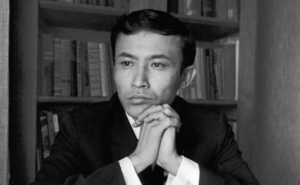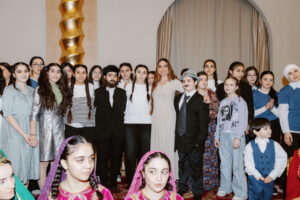Light of Shusha

Khurshidbanu Natavan of Shusha
Although the khanate was abolished, Natavan remained an important figure in Shusha, with the population referring to her as “khan qizi” (“khan’s daughter.”)
Khurshidbanu Natavan (1832-1897) was an important figure in the 19th century Azerbaijan’s society. The daughter of Mehdiqulu Khan Javanshir, she was the last living heir in the line of khans that started with Panah Ali Khan in 1747.
Although the khanate was abolished, Natavan remained an important figure in Shusha, with the population referring to her as “khan qizi” (“khan’s daughter.”) She dedicated much of her time and resources to philanthropic projects, and was particularly remembered for the series of public fountains she built throughout Karabakh to increase access to clean water and for the recreational parks she had built.
Khurshidbanu Natavan takes an important place in the history of Azerbaijani classical poetry. Her poetry reflects the Oriental women’s thoughts and feelings and shows the life of her contemporaries, their concerns and sorrow. Her realistic, lively and romantic poems convey the feelings and experiences of Azerbaijani women that were kept secret for years.
Along with Azerbaijani Natavan had a good command of Persian and Arabic languages. Since her school age she started writing poetry, did serious reading and was good at painting. Due to the knowledge of Persian language she read the works of such classical poets as Firdovsi, Sadi, Nizami, Hafiz, Navoiand Fizuli and referred to them in her poetry.

The fact that she was well aware of classical poetry rules can be understood from her poems. A certain period of her life Natavan spent in Tiflis, among the Russian aristocrats and received her education in Russian there.
In 1850 Natavan was married to a Dagestanian aristocrat Hasay khan Usmiyev, though the marriage wasn’t based on love. Natavan had to stay in Tiflis for over two years because of her husband’s business there. The life in Tiflis enlarged her world outlook and influenced her ideas and thoughts.
Natavan poetry dimension
Natavan’s creative work was strongly influenced by Fizuli’s poetry. But though Natavan learned a lot from Fizuli’s writing and was influenced by it, she tried not to imitate it and was striving to something new and independent in her poetry.
Unlike her contemporaries who were mostly writing lyrical love poems, Natavan wrote both about love, and people’s miserable position and the beauty of nature and at last in the latest period of her creative work about her personal grief, the mother’s sorrow.
Natavan’s poetry was of peculiar character. She tried to bring new meaning and content to the life experiences and the beauty of nature. She created beautiful samples of gazals, bringing different colours and motives into them. Though Natavan’s literary legacy isn’t very numerous, the works that she created won her glory and fame.
Natavan’s poetry is full of excitement, anxiety and complaint. No matter what she wrote about, she filled her poems with anxious pain and complaint of Azerbaijani women – even the most beautiful things in life are described by the poetess with worry and concern.
Natavan’s personal life gave rich material and variety of themes for her poetry. It was so full of unforgettable and significant events and contradictions that there was no need for the poetess to create new topics for her poems. That’s why she wrote her poems with true inspiration and passionate love. She didn’t give way to the repetition of the same topics, events, thoughts and phrases in her poetry.
The theme of love takes one of the important places in Natavan’s creative activity. Natavan described pure love, lovers’ parting, love yearning, desire to meet with a sweetheart with great sincerity. Natavan wrote about her contemporaries who were deprived of free and mutual love.
Natavan’s love poems convey skillfully both the soul’s sufferings and tears and the purity of a person’s dignity and morality and the poetess’s complaints about her fate and time.
Selective stanzas from some poems
- Time has plunged me into an ocean of pain and woe, Parted me with my sun-faced; all is dark wherever I go.
- My patience has reached its limit, O God Almighty on high! Either allow me to join him, or have mercy and let me die.
- How beautiful were those days when I was together with you. Now I am broken-hearted, sadly my fate I rue.
- For a while I was reunited with my lover, that pitiless man. But now I am once again lonely – I have become Natavan.
- Beloved, how could you break the oath to me you swore? Beloved, am I today not the same as I was before?
- You seek new company, love, with other women you meet, Have you forgotten me, the one that you once called sweet?
- Your love brings me love, everlasting love, Love always conflicting us, leading us to fight.
- It”s your wonderful tresses that drive me crazy What disaster comes to me, comes from their sight.
Natavan encouraged the literary careers of other women in Karabakh. She fostered the work of the younger poet Fatma Khanim Kamine and invited her to present her work at assembly gatherings. She also supported the literary and musical efforts of Shirin Khanim Aliverdibeyova, the wife of her secretary and mother of Uzeyir Hajibeyov, who would go on to be one of the most influential Azeri modernist intellectuals in the early twentieth century, almost single handedly creating Azeri opera culture.
Natavan wishes to see her lyrical hero both beautiful and clever, because beauty and mind complete each other to her mind.
She implores God to punish the enemy who creates difficulties and obstacles for the lovers. With the purpose of uniting the literary forces of Shusha Natavan established a literary society (mejlis) and led it for a long time.
When Natavan left Karabakh for Tiflis the creative activity of “Mejlisi – Uns” society slowed down. Natavan’s poetry made influence not only on Karabakh poets but also on the poets from Sheki, Shirvan, Baku, Guba, Derbend and Ganja.


